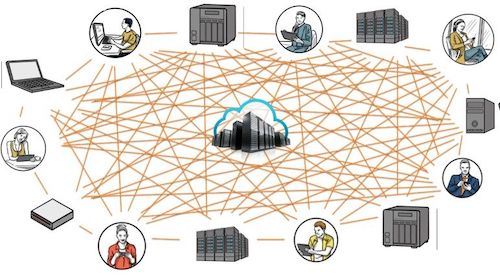NOTE: This article is "off-topic." That is, it has nothing to do with genealogy, DNA, or any of the other topics normally found in this newsletter. If you are looking for genealogy and similar articles, you might want to skip this one. However, this article provides information about a new technology that I think all computer owners should become familiar with.
Decentralized cloud architectures are becoming increasingly popular. These architectures allow for cheaper, more secure, robust, private, and reliable features than those that centralized architectures can provide.
The traditional centralized storage model is used by all the “big name” providers, including Google, Dropbox, Apple, Tresorit, ProtonDrive, Sync, pCloud, MEGA and others.
In traditional cloud storage, users’ data is stored on physical servers that are owned and operated by the cloud provider. In contrast, decentralized cloud architectures are mainly offered by companies such as Internxt, Sia, Storj, MaidSafe, Filecoin, Interplanetary File System (IPFS), and others.

Decentralized cloud providers offer several advantages. While most decentralized cloud providers do offer lower prices, the primary advantages include: greatly increased privacy, increased protection from hackers and corporate spies, and a lack of censorship.
Cloud storage is classified as decentralized if the storage system uses computer servers distributed around the world, and centralized if the storage system is singularly controlled.
In the centralized version, the storage system is maintained by the cloud controller, and it is operated by the central server provider. Users are at the mercy of the centralized cloud storage provider to continue in business, to provide encryption, and to not look at the customer's stored data.
With decentralized cloud storage providers, a group of different storage servers are used to store the data. Any files to be stored are first broken up into small "chunks" within the end users' computer(s), encrypted, then the individual "chunks" are stored on different file storage servers, often placed around the world.
These multiple servers typically are not owned or operated by any one company. Instead, they are owned and operated by independent organizations or individuals. Even if one of these independent organizations or individuals does gain access to the "chunk" of (encrypted) data stored on his or her own server, the tiny fraction of a file stored on that one server will be useless to anyone other than the one authorized individual end user who has access to all the "chunks" and also has the means to decrypt the entire file.
The result is highly increased security: even if a hacker or government spy does manage to access and encrypted "chunk" of data on one or even multiple decentralized cloud storage server(s), the result will not provide enough information to be of any use. In order to maintain data integrity and high availability across a relatively unreliable set of computers over a wide area network like the Internet, the source node will add some level of redundancy to each data block. Because of this "multiple copies stored in multiple locations," the fact that one or more servers that store the chunks going offline will be invisible to the end customer(s). "Multiple copies stored in multiple locations" provides 100% access whenever the end user wishes to retrieve files.
Therefore, all this provides higher levels of scalability, redundancy, and durability in decentralized architectures.
The individuals or companies that provide storage facilities for these "chunks" typically are compensated by receiving a small amount of money derived from each users' fees charged to those who store these "chunks."
I have been using the decentralized cloud storage services of STORJ.IO for the past few weeks and am quite satisfied with the results. First off all, STORJ.IO provides up to 150 gigabytes of storage space free of charge. Next, performance speed has been almost as fast (but not quite the speed) of Dropbox, Google Drive, and other centralized cloud storage services I have used in the past. Admittedly, STORJ.IO is the first and the only decentralized cloud storage service I have used so far. However, I believe that Internxt, Sia, Storj, MaidSafe, Filecoin, Interplanetary File System (IPFS), and others should provide similar services.
I must admit that I appreciate the ever changing and improving technology of today's online technology. My data is now saved with increased privacy, increased protection from hackers and corporate spies, and a lack of censorship. My data remains just that: my data.
You can find a lot more information about decentralized cloud storage in dozens of locations on the Internet. To do so, go to your favorite search engine and search for:
Decentralized Cloud Storage
 Latest News Articles
Latest News Articles Do you have an RSS newsreader? You may prefer to use this newsletter's RSS feed at:
Do you have an RSS newsreader? You may prefer to use this newsletter's RSS feed at: